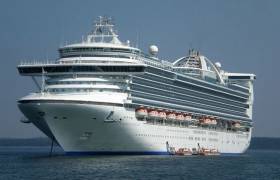Displaying items by tag: 'Magic Pipe' Record Oil Dump Fine
#RecordOilFine- A US$40m penalty is to be paid by Princess Cruises after pleading guilty to seven federal charges in an illegal ocean pollution case that involved one ship’s use of a so-called 'magic pipe' to divert oily waste into UK waters, writes The Guardian.
Miami US attorney Wifredo Ferrer told a news conference the penalty was the largest ever of its kind. A plea agreement filed in federal court also requires Carnival, the UK and US-listed parent company of the Princess line, to submit 78 cruise ships across its eight brands to a five-year environmental compliance programme overseen by a judge.
Ferrer said the illegal practices came to light when an engineer aboard the Caribbean Princess discovered the “magic pipe” in 2013 off the coast of Britain and told investigators about it.
Authorities later learned the 952ft ship had been illegally discharging oily water into the ocean since 2005.
“Our open seas are not dumping grounds for waste,” Ferrer said. “One thing we must never do is take our clear blue oceans for granted.”
A single illegal discharge dumped 4,227 gallons of oil-contaminated waste about 20 miles off the coast of England on 26 August 2013, according to court documents.
The documents also show illegal practices were found on four other Princess ships, including use of clean ocean water to fool onboard sensors that would otherwise detect dumping of improperly contaminated bilge water. Authorities say cost savings was the motive and that the ship’s officers and crew conspired to cover up what was going on.
John Cruden, assistant attorney general for the US justice department’s environmental division, said the Caribbean Princess “violated the law, they covered it up and then they lied about it”.
“We’re sending a strong message in this case to the entire industry.”
To read more on a statement released from Princess Cruises click here.
In August this year Afloat covered the story of a power failure on Caribbean Princess bound for Dublin Port which rendered the vessel adrift for nine hours on the Irish Sea.
Afloat.ie adds that Caribbean Princess is to call to Dublin Port in season 2017 as the most frequent of any cruiseship with 13 separate visits. The giant 112,894 gross tonnage vessel with a guest capacity of 3,142 (lower berths) is scheduled to make the first call in April.
The Carnival subsidiary will also see Pacific Princess calling to Dublin. Described by Princess as the 'small cruiseship experience' given the 30,277 gross tonnage and only 672 (lower berths) capacity vessel which is to make three calls. Together these cruiseships will total 16 calls calling to the capital.





























































